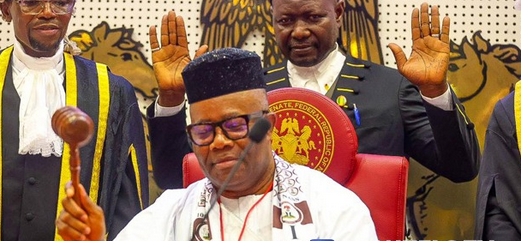On a political stage where the ghosts of past tumult are constant actor, the 10th Senate under the leadership of Godswill Akpabio has spent the past two years rewiring the National script pursuing not the thunder of high drama but the calculated quietude of stability. Since its inauguration in June 2023, the chamber has consciously cultivated an environment of political cohesion, eschewing the internal strife that has historically hobbled Nigerian legislatures. This achievement is not merely a political footnote but the foundational asset upon which a deliberate and ambitious economic reform agenda is being built. This period of uncommon stability has served as the crucial fulcrum for a legislative blitz aimed at recalibrating the nation’s fiscal architecture, investing in its people, and bolstering the institutions that underpin a modern market economy.
The economic utility of this stability cannot be overstated. By deftly managing internal dissent, the Senate leadership has significantly lowered the country’s political risk profile. For foreign and domestic investors, this predictability is paramount, creating a more reliable environment for capital allocation. The synergistic, rather than adversarial, relationship fostered with the executive arm has further ensured that critical economic legislation moves from proposal to presidential assent with an efficiency that prevents costly gridlock. This unified front projects an image of effective governance, essential for building the confidence required to tackle Nigeria’s deep-seated economic challenges.
With this stable platform secured, the Senate has advanced a raft of legislation aimed at overhauling the country’s fiscal foundations. The passage of a comprehensive suite of tax reform bills signals a strategic pivot away from a volatile, oil-dependent revenue model towards a broader, more sustainable tax base. These reforms are designed to simplify compliance, enhance transparency, and ultimately increase government revenue without unduly burdening a fragile economy. In parallel, the landmark 300% salary increase for judicial officers, the first in over a decade is a calculated investment in the integrity of the state. By insulating the judiciary from financial pressures, the act aims to strengthen the rule of law, guarantee the sanctity of contracts, and provide the dependable legal framework that is a prerequisite for robust commercial activity.
Simultaneously, the Senate has pursued a strategy of direct investment in Nigeria’s human capital, recognizing it as the ultimate driver of long-term growth. The increase of the national minimum wage to ₦70,000 is a direct injection of liquidity into the grassroots economy, intended to boost aggregate demand and improve productivity by enhancing the purchasing power of the nation’s lowest earners. This is complemented by the transformative Student Loans Act, which establishes a fund for interest-free loans to tertiary students. This policy is a long-term economic play, designed to dismantle financial barriers to higher education and cultivate the skilled, innovative workforce necessary to compete in the global economy and fuel the nation’s push towards a trillion-dollar valuation.
This legislative agenda is further fortified by a focus on both physical and digital security. Consistent approval of enhanced funding for security agencies addresses the critical need for a stable operating environment conducive to business and investment. Meanwhile, amendments to the Nigeria Data Protection Act, which mandate a physical presence for social media platforms, reflect a modern approach to governance. This move aims to enhance regulatory oversight, combat cybercrime, and build trust in the burgeoning digital economy, creating a safer and more accountable online space for commerce and communication.
While formidable economic headwinds remain, the legislative record of the 10th Senate reveals a coherent and calculated strategy. By first establishing an uncommon political stability, the chamber has been able to systematically enact reforms targeting the core pillars of the economy: a sound fiscal framework, a skilled populace, an independent judiciary, and a secure environment. For observers and investors, these actions represent more than just a busy legislative calendar; they are the foundational blocks being laid for a more resilient and prosperous Nigerian future.


